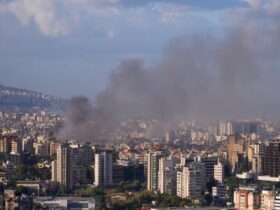Ray Youssef, CEO of the Bitcoin marketplace platform Noonesapp, made the allegation on the social media platform X, stating, “Binance has seized all funds from all Palestinians as per the request of the IDF. They refuse to return the funds. All appeals denied.”
However, the exchange platform has denied the allegation, insisting it only targeted a “limited” number of accounts linked to “illicit funds.”
The letter, reportedly signed in November 2023 by Paul Landes, head of Israel’s National Bureau for Counter Terror Financing, was allegedly referenced by the platform in response to Palestinian users who appealed the block.
The document cites an Israeli law that allows the military to issue a “temporary seizure of property of a declared terrorist organisation,” including cryptocurrencies.
Youssef wrote: “Binance has seized all funds from all Palestinians as per the request of the IDF. They refuse to return the funds. All appeals denied. Your funds are SAFU at [Binance].”
The letter continues: “In accordance with the authority delegated to me by the Minister of Defense, according to Section 61(a) of the Law on Combating Terrorism, 556-2016 (hereinafter: ‘The Law on the Fight against Terrorism’) and further to your application as a reference, I would like to inform you that your claims against Seizure of property by virtue of an administrative seizure order (T56/23) signed by the Minister of Defense on November 1, 2023, by virtue of his authority according to the law, were examined and rejected for the following reasons:
“Section 56(b) of the Anti-Terrorism Law states, among other things, that the Minister of Defense may issue an order for the temporary seizure of property of a declared terrorist organisation, as well as seizure of property used to commit a serious terrorist offense or where a serious terrorist offense was committed.
“At the basis of the administrative seizure order (T56/23) is reliable intelligence information indicating that cryptocurrency wallets, including one registered in your name, received funds from an organization declared as a terrorist entity—the Dubai Exchange Company in the Gaza Strip (declared on March 7, 2022, published in the 10084 p. 2505 on 4.4.2022).
“According to the anti-terrorism law, cryptocurrencies transferred by a declared terrorist organisation constitute the property of a declared terrorist organisation, and cryptocurrency wallets that have received such funds constitute property directly used to commit a serious terrorist offence of providing a service or establishing measures for a terrorist organisation, as defined in the Law on Combating Terrorism. Therefore, in accordance with the law, the Minister of Defence is authorised to order their seizure by administrative order in preparation for their confiscation.
“In light of the above, and as nothing in your claims contradicts the information that formed the basis of the seizure order, I intend to recommend to the Minister of Defence to order the confiscation of the property for which the seizure order was issued, in accordance with Section 66(a) of the law.
“According to the provisions of the Anti-Terrorism Law, an appeal against this decision may be submitted as a petition to the Court of Administrative Matters.”
Youssef alleged that the measure could impact not only Palestinians but also citizens of other countries bordering Israel.
“All Palestinians are affected, and judging by the way things are going, all Lebanese and Syrians will get the same treatment. Not your keys, not your coins,” Youssef claimed.
According to RT, Binance has firmly rejected the allegations, with its CEO Richard Teng dismissing the reports as “FUD”—the spreading of “fear, uncertainty, and doubt.”
“Only a limited number of user accounts linked to illicit funds were blocked from transacting. There have been some incorrect statements about this,” Teng wrote on X on Wednesday, reiterating the platform’s compliance with “internationally accepted anti-money laundering legislation.”
However, Teng did not elaborate on the number of users affected or the amount of funds “frozen” in their accounts.
Palestinians reportedly have only a minor presence on the platform, with traffic from Palestine accounting for only about 0.05% of total traffic over the past year, according to statistics from the website analytics source SimilarWeb, as reported by Cointelegraph.
The situation comes amid the ongoing conflict in Gaza, where, according to local health authorities, more than 40,500 Palestinians have been killed, and over 92,700 others injured. The Israeli war, now more than ten months in, has left large areas of Gaza in ruins under a severe blockade that has restricted access to food, clean water, and medicine.
Israel is currently facing accusations of genocide at the International Court of Justice, which has ordered a halt to military operations in the southern city of Rafah, where over one million Palestinians sought refuge before the area was invaded on May 6.









Got a Question?
Find us on Socials or Contact us and we’ll get back to you as soon as possible.